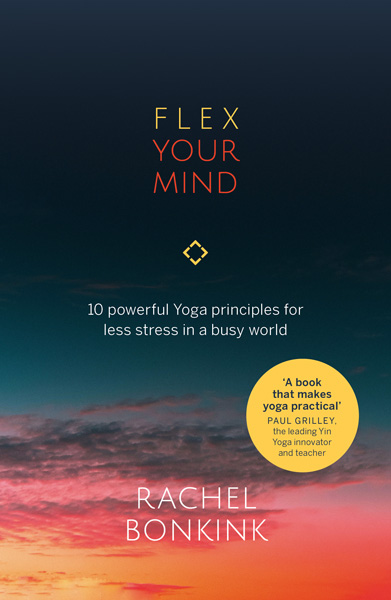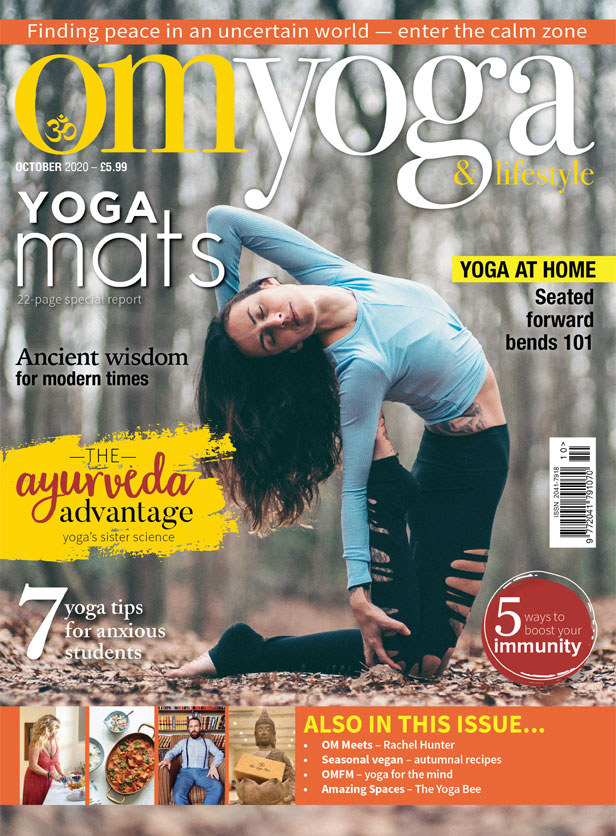
FLEX YOUR MIND
10 powerful yoga principles for less stress in a busy world. By Rachel Bonkink
How do you practice yoga off the mat and create flexibility of mind? There is a wealth of wisdom to be discovered when we explore old scriptures like the Yoga Sutras and apply these teachings to our modern-day lives. Especially in these challenging pandemic times, these teachings can bring us relief and comfort. Ten principles in particular, referred to as the Yama and Niyama in yoga philosophy, can impact your life in a very positive way. Let’s zoom in a little deeper on this roadmap to more peace of mind.
1. Non-violence: be nice
This first principle is all about figuring out how we can be the nicest version of ourselves, towards others and ourselves. It’s about noticing when the inner critic takes over and starts blasting violence in the form of judgement and harmful comments. And then hushing that voice kindly but firmly when it becomes too loud. ‘Would I say the words that I’m saying to myself now to a five-year old?’, that is the question to ask. And, towards others: ‘Can this comment hurt someone?’ If it can, revisit whether or not you want to still make the comment or need to rephrase it. This principle is not about becoming passive; we can be very passionate and defend the things we believe in, it all just happens in a non-violent way.
2. Truthfulness: open up
It’s only natural that you experience fear and anxiety from time to time. There is so much insecurity right now and the more things get cancelled, the more our happy anticipation vibes towards future events get crushed. Acknowledging this fear and being honest towards each other about it could help us all. Instead, many people pretend to feel good; they even lie in order not to upset their parents, friends or loved ones.
This holding back creates stress and tension. Who gets to see the real you? Are you even being honest with yourself? Truthfulness, and thus opening up to others, is a key principle to finding more peace of mind and learning how to accept reality as it is.
3. Non-stealing: respecting others
What most people refer to as giving advice can actually be labelled as ‘stealing someone’s enthusiasm’. Of course, we usually mean well but at the same time, we often ignore the other person’s feelings when we give our advice. Not even questioning if they actually asked for your advice or just wanted to share something.
4. Energy management: step away from vampires
It’s very simple, at times like this we need to know exactly what charges us and what depletes us of our energy. Keep your distance from energy vampires, people who negatively affect you, and look for the company of people who make you laugh, for example.
5. Non-attachment: let go
By clinging to the idea of how reality is supposed to be, you create an instant struggle. This is ‘it is what it is’, for experts. Not just using this phrase as a way to spiritually bypass reality, but truly embracing the concept that we need to accept the present moment.
6. Purity: get a grip
Mindful living and meditation are ways to purify our thoughts and thus our mind. By constantly training our minds and sharpening our attention skills, we can actually get a grip on our thoughts. We will notice quickly when our thoughts are not pure or calming so that we can change the way we think.

7. Contentment: joy is not conditional
“Once this is all over, I will be happy again.” If you think like this, you are giving up the control to feel good and placing that responsibility for feeling good entirely onto something that is completely out of your control. You are also making your happiness and feelings of contentment conditional and that is never true. All the elements to feel content are already inside us. Of course, we are not pleased or satisfied with how this pandemic is disturbing most of our lives, but we can still feel content, we can still have this naturally good feeling inside of us.
8. Self-discipline: the price to pay
It asks for self-discipline to do your exercises, to stay healthy, to eat well and to stay on track with your good intentions and goals. To keep your motivation up, you need to have a crystal-clear idea of why you want to reach a specific goal. Make this goal something so powerful that it will pull you towards reaching it instead of it being a struggle to get there. Make it into a journey towards goals instead of a mind and body battle.
9. Self-inquiry: what do I know?
Instead of getting frustrated with others, check in with yourself on a deeper level to explore what it is that triggers you about them. And very practically, make every single day a learning experience. Having the ‘beginner’s mind’ as they say in Buddhism. Creating a joyful curiosity towards life and every single feeling that pops up tends to lighten things up a lot.
10. Surrender
After we set our goals, we put in the work and we keep going: we need to trust that everything will work out the way it is supposed to. Without wandering off into too much spiritual talk, we just need to accept that there is little control in life, in general.
By applying these 10 principles and training the mind, we can cultivate new ways of thinking, feeling, speaking and acting. This way, we are not mindlessly reacting to every impulse that we have but we can actually choose to respond to situations, or not.

Rachel Bonkink is the founder of Revealing Vajra Yoga Retreats (revealingvajra.com). Her new book, Flex Your Mind: 10 Powerful Yoga Principles For Less Stress In A Busy World is now available on amazon, £12.99. Visit: mybook.to/FlexYourMind


